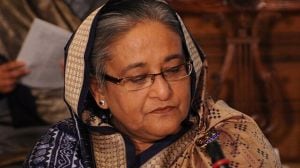Egypt claims support for Constitution change, rights body alleges fraud
Even as the government said the people overwhelmingly endorsed the constitutional amendments...

Even as the government said the people overwhelmingly endorsed the constitutional amendments, a state-appointed human rights body accused Egypt’s government of fraud on Tuesday, charging that public sector-workers were forced to vote in a referendum.
Justice Minister Mamdouh Marei told a news conference that the ‘yes’ vote in Monday’s referendum on 34 constitutional amendments was 75.9 percent, but only 27 percent of the 36 million voters had bothered to cast their ballots.
Opposition groups had urged voters to boycott the referendum, arguing the amendments were a setback to democracy as they increased the president’s security powers and the chances of fraud in elections — a long term problem in Egypt.
President Hosni Mubarak greeted the results announced on Tuesday as a victory for the people and promised further unspecified political reform. He did not mention the low turnout.
But the National Council for Human Rights, a state-appointed body headed by former UN Secretary-General Boutros Boutros Ghali, reported numerous flaws.
“The most important and dangerous aspect of the referendum was the low turnout despite a big media campaigns,” the council said. The official turnout was 2 per cent higher than in the contested 2005 legislative elections.
Egyptian rights groups had predicted an extremely low turnout as many polling stations were virtually deserted for most of the day.
Mubarak had rushed the 34 amendments into law, holding the referendum only seven days after the Parliament approved them.
But the opposition said the amendments would reduce the judicial checks on election fraud and boost presidential power at the expense of civil rights. The biggest opposition bloc, the Muslim Brotherhood, bitterly resented the ban on religion-based parties, an amendment that was clearly aimed at the group. A report by the country’s judges into the 2005 referendum said the official turnout of 54 per cent was grossly exaggerated.



- 01
- 02
- 03
- 04
- 05




























